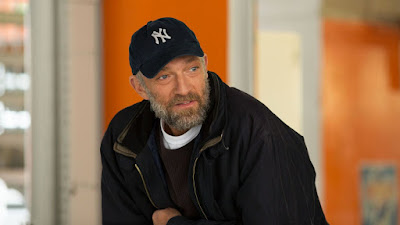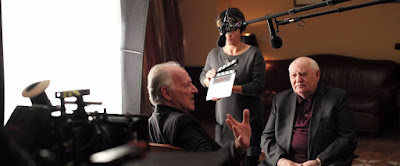Victor (Daniel Auteuil), sixtysomething, has his life turned upside down the day that Antoine (Guillaume Canet), a flourishing entrepreneur, offers him a unique brand of entertainment. Using a combination of theatrical artifice and historical re-enactment, his company gives its clients the opportunity to delve back into the period of their choice. Victor decides to relive the most memorable week of his existence, 40 years earlier, when he met the love of his life.
There is always something fascinating about the wide array
of narratives and stories to be discovered in foreign films. There is an
experimental tone to them that Hollywood film studios are not brave enough to
take a financial gamble with. The premise alone is titillating, with a unique
outmoded response to a common occurrence, integrating modern technology with
traditional theatre.
In fact, thanks to the often over-the-top and excessive
physical humour on display in the majority of films show at the major cinema
chains, it is refreshing to be reminded that comedy can be subtle. La Belle Époque
exquisitely lines a dramatic storyline with a thin veil of comedy. Not
something that will have you clutching your gut, laughing out loud, but it will
frequently give you a chuckle, and keep a smile on your face for the majority
of the run-time.
In what is a very relatable story, La Belle Époque
revolves around the idea of those caught in the trap of nostalgia. No
longer living for their current self, instead, constantly looking back at their
past achievements and memories as if one’s life has already concluded. That
depressive state of mind that drains the life of an individual. La Belle Époque
forces its protagonist to confront change and evolution by recreating past
experiences, providing an answer to the philosophical question of what one
would do if they could go back in time and relive their youth with their
memories still intact.
It is a curious intertwining of stories, with the method of
time-travelling escapism having its own story arcs unbeknownst to the
protagonist. It opens up a myriad of potential directions for the film to
choose from outside of the typical formulaic rom-com direction. Many of the
expected tropes are still present in the narrative, but they all have an extra
layer of latent possibilities and meanings thanks to these “behind-the-scenes”
arcs.
The colour schemes are very effective, with the 1970s scenes bathed in natural greens, and warm yellows and browns, increasing that feeling of nostalgia and comfort. This contrasts the scenes of reality which are often dark with blues, greys, and black, creating a cold, bleak, and detached mood.
The acting talent is exactly that; full of talent. Daniel
Auteuil plays our ageing, depressed, male protagonist, Victor, rediscovering his
spark thanks to the younger counterpart of his wife, the actress Margot, played
by Doria Tiller. If there is one thing that the French do well, it is romance
and passion, and the blossoming relationship between Tiller and Auteuil is
adorably charming and impassioned. Victor’s wife Marianne, who detests the
stale nature of her marriage is well-executed by Fanny Ardant, flippant and
foxy, but desperate to recapture her own youth in a different manner.
The real fascination comes from the puppet-master Antoine
(played by Guillaume Canet). His motivations are ambiguous, his goals seem
kind-hearted, and his methods are downright manipulative and deceitful. Yet,
these conflicting tones make his character all the more enthralling as we watch
Antoine siting in the middle of his web, feeling for the disturbances in his
interactions with most of the main cast. He controls the settings, the people, the
interactions, the weather, the music, the lighting. All but one strong mind fall prey to his bidding.
The level of intricacy and layers upon layers of planning
are indicative of his controlling personality as he attempts to constrain and
coordinate the chaos. This narrative goes deeper than a regular rom-com, with
suspense, tension and more than one double-cross. It doesn’t simply throw a
love story at the audience; it generates an intriguing story and mystery that
exists outside of the romance. It isn’t so convoluted that it becomes
pretentious, but it also isn’t so predictable that it loses the fun, energetic
atmosphere. I’ve missed the subtlety of a well-written comedy, and La Belle Époque
is definitely going to vibe well with its audience.
La Belle Époque is in cinemas from February 6, 2020















































